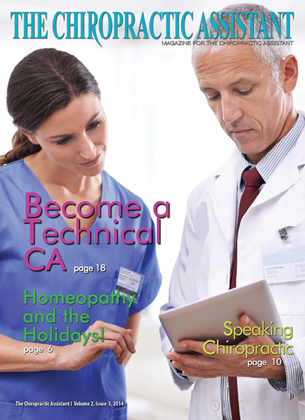C hiropractic assistants (CAs) are the glue that holds practices together and the engines that keep the systems humming and growing. Simply put, CAs are essential for smooth patient flow and care plan management. However, at the front desk, acting as "mission control" is only one-half of the equation. Amazing practices have developed and mastered the other side of the success formula: assisting in clinical excellence. Care planning begins with a commitment from the patients to the doctor to attend the office and follow the best advice as they travel their path towards wellness. The commitment of the doctor and the team includes an initial consultation and examination continuing with regular reexaminations and reports that inspire and direct the patient. This is where the next great opportunity can exist for a CA's career advancement and satisfaction. Becoming a clinical or tech chiropractic assistant (TCA) can be rewarding on many levels and incredibly important for the growth and development of the practice. Becoming a TCA means there will be new skills and new communication methods to learn. The great news is that most of this training can be done within the existing office environment or at special training sessions without having to enroll in longer-term educational programs. The role of the TCA is to assist or take control of certain clinical and reporting aspects of the consultations, exams, reexams, and reports. Many offices start patient care plans with the best intention of following up with regular reexams and reports. Inevitably, busy schedules, poor patient compliance, or lack of resources means that the reexams and reports are delayed or canceled. The outcome is predictable. The patient feels better and loses his or her desire to stay well adjusted and focused on lifelong wellness. Patients leave care far too early, when the simple solution is to have a team that is trained and committed to regularly retesting the patients' improvements and giving important feedback on their future care and future outcomes. Here's another great bit of news. Front desk chiropractic assistants (FDCA) can easily wear two hats in any growing practice. With proper patient scheduling, holes can be created in the appointment book to accommodate exams and reports. When the regular traffic flow of patient care eases, the FDCA can switch over to the TCA and perform exam and consultation duties. As the practice grows, the need for a dedicated TCA will become necessary. At that time, the multitalented CA can choose which path best suits the practice and his or her career advancement. Training to become a TCA can be fun and exciting. Remember, the doctor is not looking for your clinical opinion, just your clear desire to help the patient understand the importance of chiropractic care. Gathering clinical data and performing tests can be done with certainty and ease if certain training protocols are followed. A TCA must also manage being in close physical presence with patients. For some, this can be awkward while others relish the opportunity to be more involved in the clinical side of care. Depending on which exam procedures and technologies are used, TCA training can move forward very quickly. For instance, our company, CLA, provides spine and nerve scanning technologies that measure stress and changes in a patient's ability to stay well. The Insight Scanning system can use up to five different sensors to detect these changes. However, the use of each sensor can be learned with simplified training sessions over just a few days. In a very short time, TCAs can become incredibly proficient in scanning the patient and preparing the reports for the doctor. Many TCAs become so capable that they can support the reporting process by discussing lifestyle stress and the changes that are noticed on the scans. This assists the doctor by setting the stage for a shift from pain-based care towards wellness care. CLA's motto, "You are not alone," is important in the development of a TCA. CLA offers online tutorials for each of the sensors, and special certification training days are available in locations around the country. These are opportunities to polish your TCA skills, introduce new CAs to training, or join a forum to ask questions. Gathering the skills to become a TCA is available from both your doctor and CLA at any time. Choosing to become a CA was perhaps the best career choice you could have ever made. Serving people in need and inspiring families to seek wellness instead of drug-based medical care is a noble mission. Taking the next step and becoming your office's TCA allows you to communicate and share your certainty and passion for chiropractic at the next level. Could today be the day that your career as a TCA is launched? Ask your doctor and also go to subluxation.com to get a feel for the kind of technologies that are changing the face of chiropractic. Now, imagine that you are the leader of your office's clinical team. Feels awesome, doesn't it? Dr. David Fletcher is an original wellness practitioner. Families, individuals, corporations and audiences around the world listen and learn from Dr. Fletcher about their innate ability to achieve new and exciting ways to express their potential. Besides being an active community practitioner. Dr. Fletcher owns and runs Chiropractic Leadership Alliance (C1A), a chiropractic technology company that offers leading edge analysis on the effects of stress and lifestyle choices on the nervous system. This technology is embraced by chiropractic wellness doctors, professional sport teams and research facilities around the world while being recognized by the Space Foundation as a significant addition to the space program. For comments or questions please write to infold subluxation.com. subject: Tech CA and visit the CLA website at www.subluxation.com.
 View Full Issue
View Full Issue









